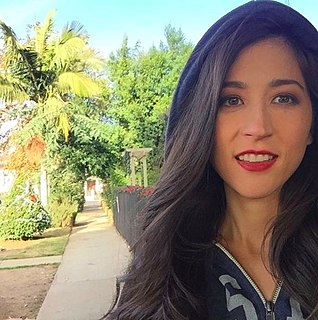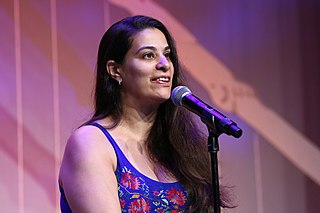A Quote by Masha Tupitsyn
The way something looks or sounds is also what it means. Words as visual and aural phenomena, which mainly poets, not critics and prose writers, tend to be obsessed with. I think maybe I'm more of a curator than I am a writer in the strict sense because I am interested in how everything on the page, in a space, works together.
Related Quotes
In general, I would think that at present prose writers are much in advance of the poets. In the old days, I read more poetry than prose, but now it is in prose where you find things being put together well, where there is great ambition, and equal talent. Poets have gotten so careless, it is a disgrace. You can’t pick up a page. All the words slide off.
I realize that Facebook today is a global success with more than 600 million users worldwide. But I also understand, maybe a bit sadly, that it is not for me. Perhaps it is because I am a bit too old? Or perhaps it is because I am more interested in exploring the epic text, which I have lived with for all my life.
Poets seem to write more easily about love than prose writers. For a start, they own that flexible ‘I’…. Then again, poets seem able to turn bad love – selfish, shitty love – into good love poetry. Prose writers lack this power of admirable, dishonest transformation. We can only turn bad love into prose about bad love. So we are envious (and slightly distrustful) when poets talk to us of love.
Of course I can have a simple reaction of sympathy and sorrow to destruction. But you also know that you can't have new things if you don't occasionally destroy the old. That's something you're really not allowed to say because things are often destroyed according to particular power relations so it means taking a stand in those cases, which I am not really interested in doing either. I think I am simply interested in looking.
I am a writer who is definitely working with a specific language and more than English, that language is American. And I work very much in idiom and am very interested in the play of different kinds of rhetoric, whether it is the more high-flown stuff that reeks of age. I love to juxtapose something like that with something more current or urgent. I am always interested not in America by itself, but America as an idea and how that idea has changed over time, in the eyes of the rest of the world and in the eyes of Americans.
I'm very concerned with questions of language. This is what I think of when I think of myself as a writer: I'm someone who writes sentences and paragraphs. I think of the sentence - not only what it shares but, in a sense, what it looks like. I like to match words not only in a way that convey a meaning, possibly an indirect meaning, but even at times words that have a kind of visual correspondence.
Once I do something, I need to be obsessed - or maybe I don't need to be obsessed, but I get obsessed because that's just the way my brain works - but I need to pay a lot of attention to detail. Because everything counts to me once I do something, even if it's a movie that nobody cares about. That's why I need to choose very well what I want to do. But in real life, when I watch TV or whatever, I guess I'm not that obsessive guy, and I'm pretty boring.
For me, fiction belongs to my inner being, is something essential which defines me - I am a fiction writer in the same way I am a woman, the same way I am dark-haired - it is something essential and structural. It's like an exogenous skeleton that keeps me going. And I don't know how I would manage to live without writing, working with words.





































